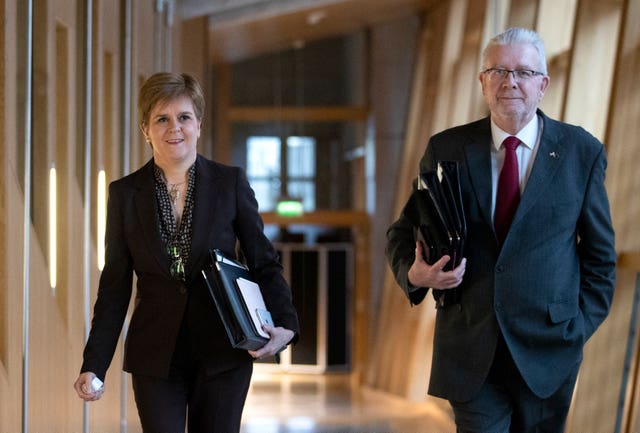Nicola Sturgeon has accused Boris Johnson’s government of launching a “full-scale assault on devolution” over plans for Westminster to regulate state subsidies after Brexit.
Scotland’s first minister warned that if decision-making powers over state aid were reserved to Westminster, it would be a “blatant move to erode the powers of the Scottish Parliament”.
But Downing Street said it has always considered “the regulation of state aid to be a reserved matter”.
Make no mistake, this would be a full scale assault on devolution – a blatant move to erode the powers of the Scottish Parliament in key areas. If the Tories want to further boost support for independence, this is the way to do it. https://t.co/Gt2b3W7X05
— Nicola Sturgeon (@NicolaSturgeon) July 13, 2020
Post-Brexit trade deal negotiations
It’s one of the key sticking points in the negotiations on a post-Brexit trade deal as the UK leaves the EU’s single market regime at the end of 2020.
Sturgeon shared a Financial Times report that suggested the UK government wants to control state aid policies at the end of the Brexit transition period. It would risk conflict with the Scottish and Welsh Parliaments, which want the powers to be devolved. Sturgeon tweeted:
Make no mistake, this would be a full-scale assault on devolution – a blatant move to erode the powers of the Scottish Parliament in key areas.
If the Tories want to further boost support for independence, this is the way to do it.
The UK government is expected to bring forward legislation to the House of Commons in the autumn that may entail state aid policies – such as subsidising companies – being reserved to Westminster.

A potential “power grab”
The official spokesperson for Boris Johnson said:
We’ve always been clear we consider the regulation of state aid to be a reserved matter.
We’ll continue to work with the devolved administrations to look to agree a modern system for supporting British business in a way that benefits all within the U.K.
Scotland’s constitution secretary Mike Russell has previously said plans to enshrine a UK “internal market” after Brexit would seriously undermine devolution. He described these plans as a potential “power grab”.
In a letter to cabinet minister Michael Gove, Russell said he’s concerned about proposals for an external body that would “test” whether a bill in Holyrood affected the UK’s internal market. Russell also expressed concerns over plans which he said could lower regulatory standards beyond what the Scottish Parliament found acceptable.
In response, Gove accused Russell of trying to “confect” a political row. Downing Street defended efforts to protect the “internal market”. The prime minister’s official spokesperson said:
We’ll be setting out our approach to protect businesses, jobs and trade within the UK after the end of the transition period in due course.











